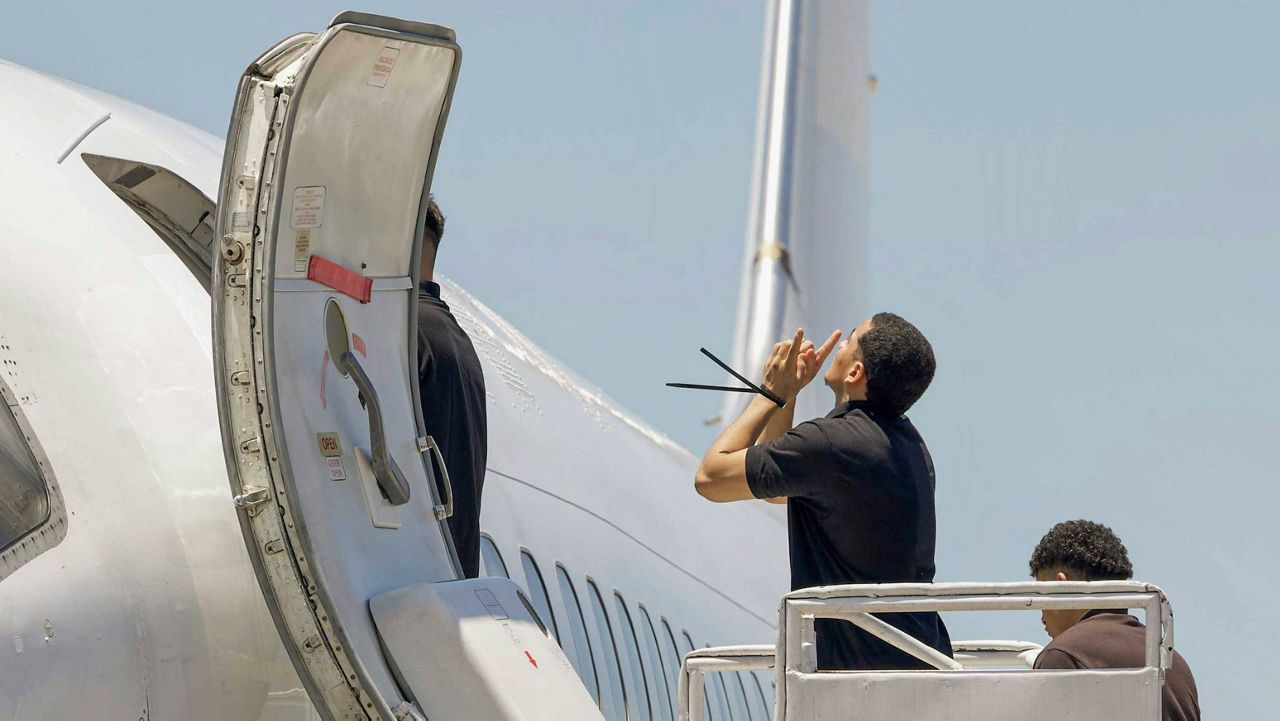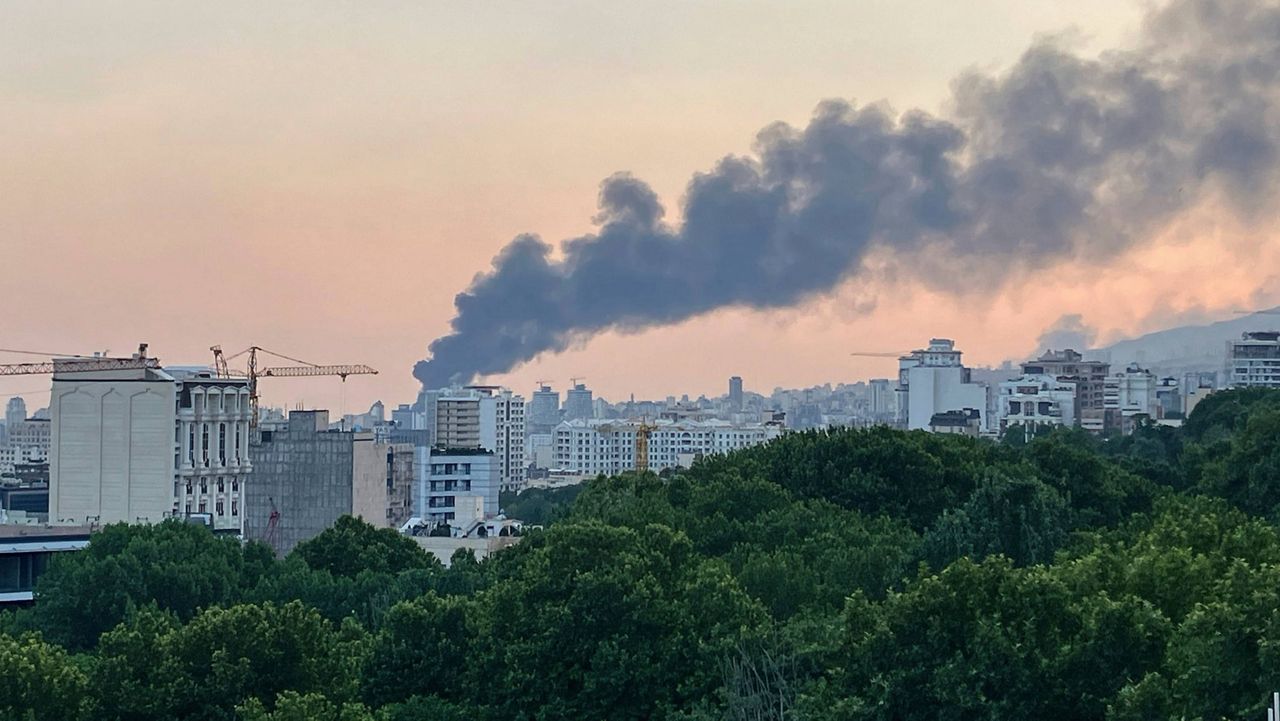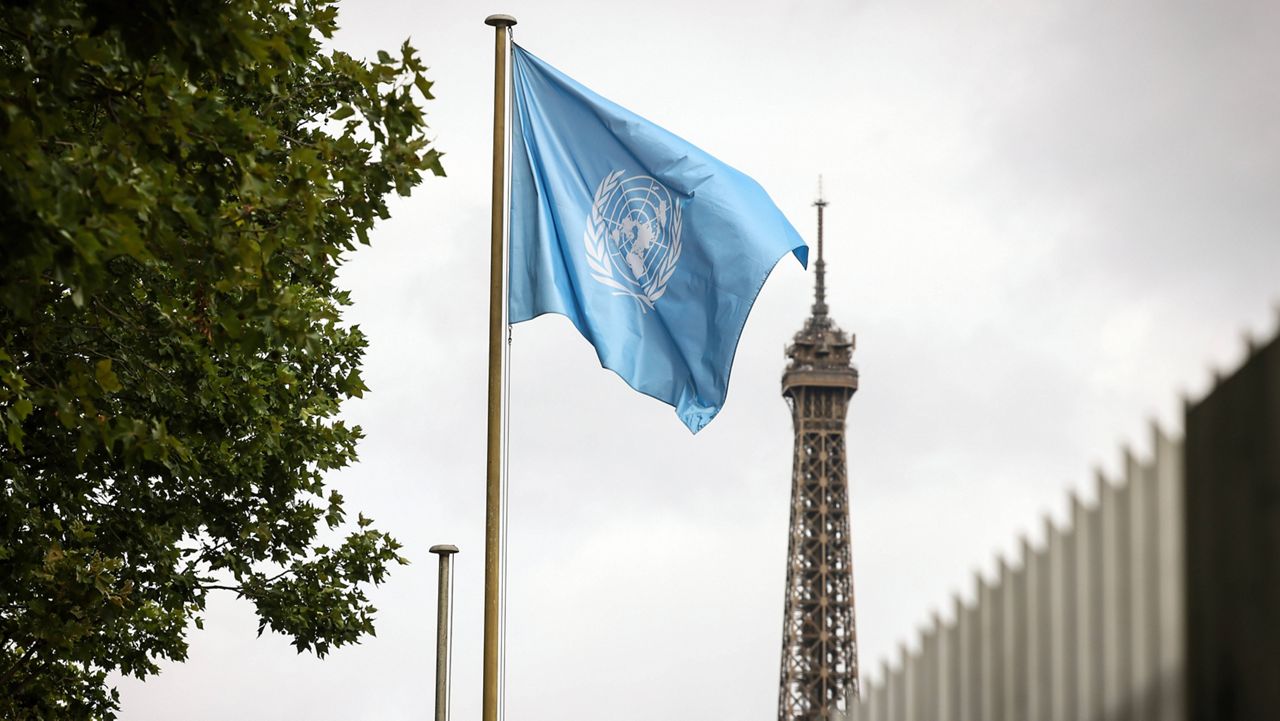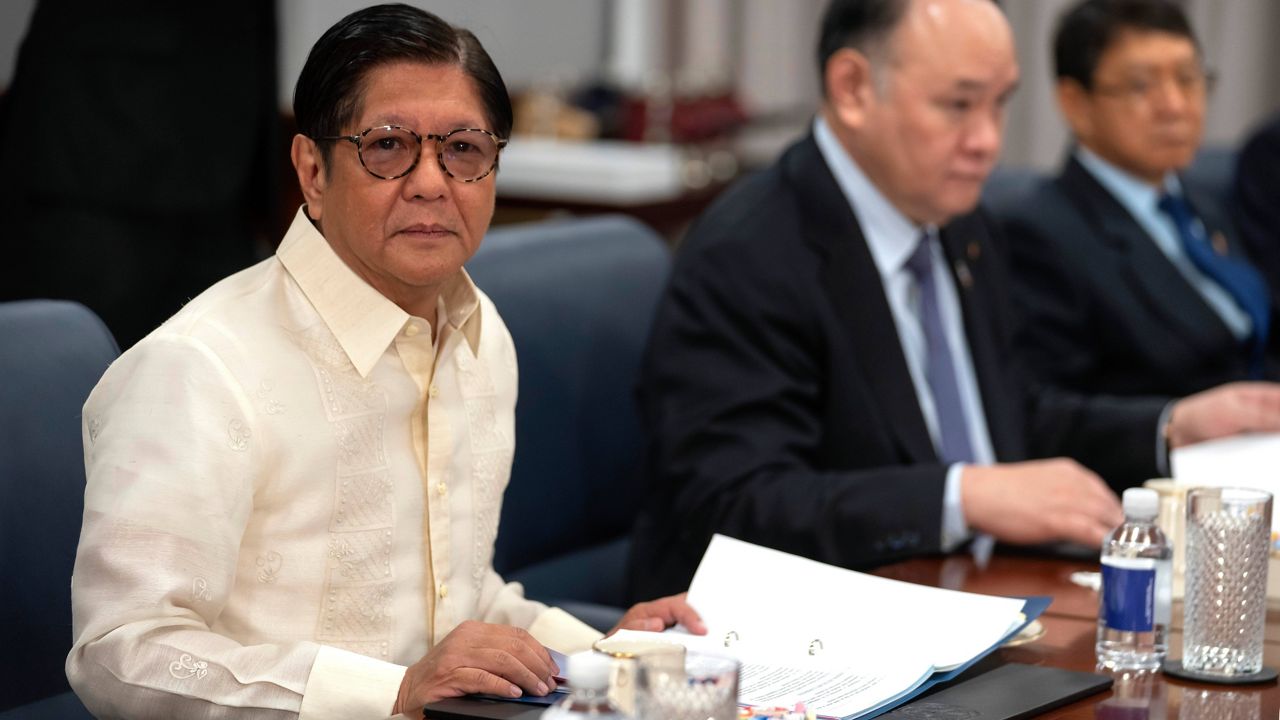Five Americans detained for years in Iran walked off a plane and into freedom Monday, many arm-in-arm, as part of a politically risky deal that saw President Joe Biden agree to the release of nearly $6 billion in frozen Iranian assets owed by a third country, South Korea.
The successful negotiations for the Americans' freedom brought Biden profuse thanks from their families but heat from Republican presidential rivals and other opponents for the monetary arrangement with one of America's top rivals.
What You Need To Know
- Five prisoners sought by the U.S. in a swap with Iran were freed Monday and headed home as part of a deal that saw nearly $6 billion in Iranian assets unfrozen
- President Joe Biden hailed their release in a statement when they arrived in Qatar, celebrating that they will "soon be reunited with their loved ones—after enduring years of agony, uncertainty, and suffering
- After the plane slowed to a stop, three of the prisoners walked down the ramp and were greeted by the U.S. ambassador to Qatar, Timmy Davis; the former prisoners hugged the ambassador and others
President Joe Biden hailed their release in a statement after their plane from Tehran arrived in Qatar, celebrating that they will "soon be reunited with their loved ones—after enduring years of agony, uncertainty, and suffering."
Iran’s hard-line President Ebrahim Raisi, on hand for the United Nations General Assembly in New York, suggested Monday's exchange could be “a step in the direction of a humanitarian action between us and America.”
“It can definitely help in building trust,” Raisi told journalists.
However, tensions are almost certain to remain high between the U.S. and Iran, which are locked in disputes over Tehran’s nuclear program and other matters. Iran says the program is peaceful, but it now enriches uranium closer than ever to weapons-grade levels.
The prisoner release unfolded amid a major American military buildup in the Persian Gulf, with the possibility of U.S. troops boarding and guarding commercial ships in the Strait of Hormuz, through which 20% of all oil shipments pass.
After the plane slowed to a stop, three of the prisoners walked down the ramp and were greeted by the U.S. ambassador to Qatar, Timmy Davis. The former prisoners hugged the ambassador and others.
The three — Siamak Namazi, Emad Sharghi and Morad Tahbaz — then wrapped their arms around their shoulders and walked off to a building in the airport.
In a statement issued on his behalf, Namazi said: “I would not be free today, if it wasn’t for all of you who didn’t allow the world to forget me.”
“Thank you for being my voice when I could not speak for myself and for making sure I was heard when I mustered the strength to scream from behind the impenetrable walls of Evin Prison,” Namazi said.
Secretary of State Antony Blinken said that he had the "great pleasure" of speaking with the now-freed individuals on Monday, calling it an "emotional conversation" for both sides.
"It's easy in the work that we do every day sometimes to get lost in the abstractions of foreign policy and relations with other countries and forgetting the human element that's at the heart of everything we do," Blinken said. "But today, their freedom, the freedom of these Americans for so long unjustly imprisoned and detained in Iran, means some pretty basic things. It means that husbands and wives, fathers and children, grandparents, can hug each other again, can see each other again, can be with each other again. So it's a day that I'm grateful for."
President Biden also held what the White House called an "emotional" conversation with families of the citizens who are returning from Iran, according to a pool report.
Biden thanked "partners at home and abroad" for their assistance in brokering the deal, giving special thanks to the Emir of Qatar, Sheikh Tamim bin Hamad, and to the Sultan of Oman, Haitham bin Tariq, and their governments, as well as those of Switzerland and South Korea.
"As we celebrate the return of these Americans, we also remember those who did not return," Biden said. "I call on the Iranian regime to give a full account of what happened to Bob Levinson," a former DEA and FBI agent who disappeared in 2007 in Iran while on a mission for the CIA. Levinson's family announced his presumed death in 2020.
"The Levinson family deserves answers," Biden continued. "Today, we are sanctioning former President Mahmoud Ahmadinejad and the Iranian Ministry of Intelligence under the Levinson Act for their involvement in wrongful detentions. And, we will continue to impose costs on Iran for their provocative actions in the region."
"As we welcome home our fellow citizens, I once more remind all Americans of the serious risks of traveling to Iran," the president added. "American passport holders should not travel there."
The United States did not immediately identify the other two freed American citizens, all of whom were released in exchange for five Iranians in U.S. custody and for the deal over the frozen Iranian assets. The Biden administration said the five freed Iranians posed no threat to U.S. national security.
In addition to the five prisoners, two of the imprisoned Americans' family members, Effie Namazi and Vida Tahbaz, who had been held under travel bans in Iran, also were on the plane. The women, too, clasped arms and kissed on the tarmac in Qatar.
Earlier, Iranian Foreign Ministry spokesman Nasser Kanaani said the exchange would take place after nearly $6 billion in once-frozen Iranian assets reached Qatar.
“Fortunately Iran’s frozen assets in South Korea were released and God willing today the assets will start to be fully controlled by the government and the nation,” Kanaani said.
He said two of the Iranian prisoners will stay in the U.S. Meanwhile, Nour News, a website believed to be close to Iran’s security apparatus, said two of the Iranian prisoners were in Doha for the swap.
The cash represents money South Korea owed Iran — but had not yet paid — for oil purchased before the U.S. imposed sanctions on such transactions in 2019.
The U.S. maintains that, once in Qatar, the money will be held in restricted accounts to be used only for humanitarian goods, such as medicine and food. Those transactions are currently allowed under American sanctions targeting the Islamic Republic over its advancing nuclear program.
Iranian government officials have largely concurred, though some hard-liners have insisted, without evidence, that there would be no restrictions on how Tehran spends the money.
Mohammad Reza Farzin, Iran’s Central Bank chief, later came on state television to acknowledge the receipt of over 5.5 billion euros — $5.9 billion — in accounts in Qatar. Months ago, Iran had anticipated getting as much as $7 billion.
The planned exchange comes ahead of the convening of world leaders at the U.N. General Assembly this week in New York, where Raisi will speak.
The deal has already opened Biden to fresh criticism from Republicans and others who say the administration is helping boost the Iranian economy at a time when Iran poses a growing threat to American troops and Mideast allies.
Former President Donald Trump, currently the Republican frontrunner to challenge Biden next year, called it an “absolutely ridiculous” deal on his Truth Social platform.
The prisoners freed Monday were: Namazi, who was detained in 2015 and later sentenced to 10 years in prison on spying charges; Emad Sharghi, a venture capitalist sentenced to 10 years; and Morad Tahbaz, a British-American conservationist of Iranian descent who was arrested in 2018 and also received a 10-year sentence.
The U.S. government, the prisoners' families and activists have denounced the charges against the five Americans as baseless.
In a statement, Sharghi’s sister, Neda, said she “can’t wait to hug my brother and never let him go.”
“This is my brother, not an abstract policy," she added. "We are talking about human lives. There is nothing partisan about saving the lives of innocent Americans and today should be a moment of American unity as we welcome them home.”
The five prisoners Iran has said it seeks are mostly held over allegedly trying to export banned material to Iran, such as dual use electronics that can be used by a military.
The two that Nour News said were in Doha were: Mehrdad Ansari, an Iranian sentenced to 63 months in prison in 2021 for obtaining equipment that could be used in missiles, electronic warfare, nuclear weapons and other military gear, and Reza Sarhangpour Kafrani, an Iranian charged in 2021 over allegedly unlawfully exporting laboratory equipment to Iran.
Iran and the U.S. have a history of prisoner swaps dating back to the 1979 U.S. Embassy takeover and hostage crisis following the Islamic Revolution. Their most recent major exchange happened in 2016, when Iran came to a deal with world powers to restrict its nuclear program in return for easing sanctions.
The West accuses Iran of using foreign prisoners — including those with dual nationality — as bargaining chips, an allegation Tehran rejects.
Negotiations over a major prisoner swap faltered after then-president Trump unilaterally withdrew America from the nuclear deal in 2018. From the following year on, a series of attacks and ship seizures attributed to Iran have raised tensions.
Meanwhile, Iran’s nuclear program now enriches closer than ever to weapons-grade levels. While the head of the United Nations’ nuclear watchdog has warned that Iran now has enough enriched uranium to produce “several” bombs, months more would likely be needed to build a weapon and potentially miniaturize it to put it on a missile — if Iran decided to pursue one.
Iran maintains its nuclear program is peaceful, and the U.S. intelligence community has kept its assessment that Iran is not pursuing an atomic bomb.
Iran has taken steps in recent months to settle some issues with the International Atomic Energy Agency. But the advances in its program have led to fears of a wider regional conflagration as Israel, itself a nuclear power, has said it would not allow Tehran to develop the bomb.
Iran also supplies Russia with the bomb-carrying drones Moscow uses to target sites in Ukraine in its war on Kyiv, which remains another major dispute between Tehran and Washington.









